Kakera – A Piece of Our Life
- Year
- 2009
- Original title
- Kakera
- Japanese title
- カケラ
- Director
- Cast
- Running time
- 107 minutes
- Published
- 29 March 2010
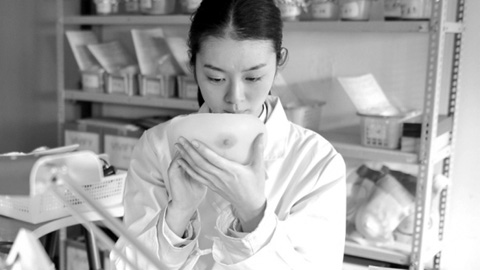
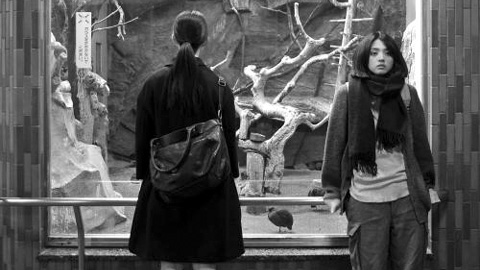
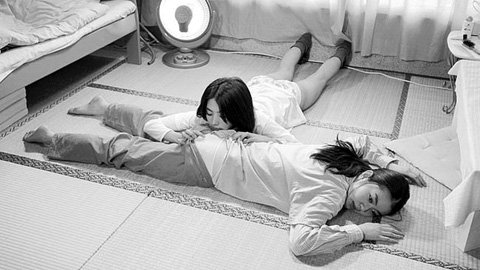
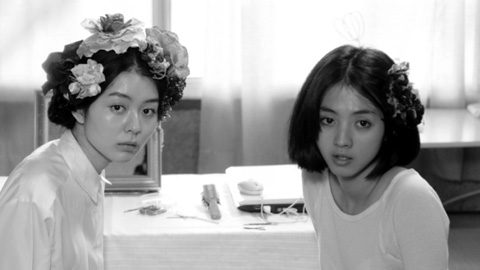
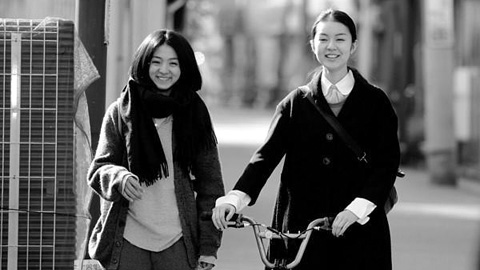
by Roger Macy
The star of the Japanese documentary The Gift from Beate (2004) claimed in London recently that it was the custom - until the post-war constitution - for Japanese women to walk several metres behind their husbands. But if it were really such a persistent habit, it seemed strange to me that I had never seen the custom in a single Japanese film, documentary or fictional.
But coming timely in support of Beate Sirota Gordon is a film from Momoko Ando, where a young woman is seen trailing desultorily behind both her husbands in turn - in 2009. OK, she wasn't actually married to either, and in one case, she couldn't have. Same-sex marriage still isn't legal in Japan.
Kakera, I hasten to point out, is very much a contemporary film centred on students and young people of similar age. It has a vibrant visual and musical appeal and Ando has shown skill unexpected of a debutante director in stitching together some quite disparate elements.
Kakera co-stars Hikari Mitsushima, who only recently shot to fame after a long career in Japanese film and who starred in the big hit Love Exposure. Mitsushima has deliberately been cast by Ando against type as a placid, if very fetching, doormat. In doing so, Ando has sought to address what she sees as a widespread situation in the girls she knows, that they do not know whether they love their boyfriends or not and do not feel in control.
Although Mitsushima delivers a controlled performance, in her child-like walk and posture, her character, Haru, as we see her to begin with, has absolutely no reason to feel in control. 'Chotto' ('a bit') is a ubiquitous way of saying 'no' in polite Japanese conversation, but it's no way to say 'no' when a boyfriend has one arm around you and the other slipping off your pants. Subsequently, Haru says 'yamete', which makes a second rape undeniable. Except that she then does her best to help her boyfriend feel comfortable about rape.
Haru is irresistibly cute and attractive, and had earlier encountered Riko, played by Eriko Nakamura, coming onto her in a café. Haru chooses to hear the language of friendship in which Riko's approach is expressed and, after the rapes have caused Riko to tentatively separate from said boyfriend, a joyful courtship ensues in which each is happy to pull the other forward. This sequence, especially, is carried forward sympathetically by the music of James Iha, once with The Smashing Pumpkins, who also did the music for Linda, Linda, Linda. The deepening of this relationship however, is triggered at each stage by a bout of grossness and cheating of boyfriend. Director Ando has gone on record that she hopes a certain ex sees himself in this character. The problem with this, as I presume Ando realises, is that it posits said boyfriend as being in control of the relationship between the two young women.
Viewers will have to make their own mind up as to all further developments of the story, as I honestly don't know what happens next. Is it a chaste relationship, or a chaste depiction of a sexual relationship? My reasons for thinking the former are that Ando was unambiguous and unsubtle for the rape scenes. Although, ultimately, she used ellipsis, the shock-and-awe foreplay upon the prone female body is enacted in front of a video playing a WW2 American War Department, gung-ho film. Coyness does not seem to become Ando, so I presume the coyness is in her characters. But that's just my reading.
And I didn't get the doves.
There are other strong talents lifting this film. Hirokazu Ishii, a cinematographer new to me, has found pleasing compositions, some of them obviously classically informed. Eriko Nakamura, also new to western audiences, acquits a demanding role. She has long, difficult monologues, opposed roles at different poles of lesbian relationships, a family, and a work life as a maker of prosthetics for missing body-parts, a theme complimentary to that of 'kakera' - the broken pieces of the title. I would have liked to see the roles of Riko's family developed more, but Ando intentionally focuses on the bitter-sweet coming-of-age relationship of the two young women.
It's certainly possible to see the influence of some famous Japanese names in the emerging style of Ando. But these have not necessarily been handed down directly. Ozu-style reverse-field matches even crop up these days in Hollywood films like Up in the Air, and, it is worth recalling, Ando's filmic studies have been mostly in London. As for the techniques Ando used to help Mitsushima to feel suitably downtrodden, they sound like out of the directing book of Akira Kurosawa - the crew were told to ignore and cold-shoulder her. But Ando is smart enough to keep these names to herself and pitch her debut work confidently at the age-group she depicts. Whilst succeeding in making a film with appeal for this generation, she has tackled some more difficult areas for mainstream entertainment, and I look forward to seeing more of her work.